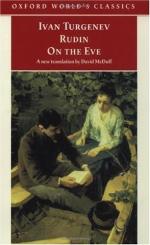|
This section contains 5,710 words (approx. 20 pages at 300 words per page) |

|
SOURCE: Costlow, Jane T. “Speaking the Sorrow of Women: Turgenev's ‘Neschastnaia’ and Evgeniia Tur's ‘Antonina.’” Slavic Review 50, no. 2 (summer 1991): 328-35.
In the following essay, Costlow explores the influence of Evgeniia Tur's Antonina on Turgenev's “Neschastnaia.”
In a letter of 1868 to Pavel Annenkov, Ivan Turgenev spoke of “Neschastnaia,” the story that he had just finished writing, as “moia posledniaia dochka.”1 Authorship and paternity are conflated in this phrase, as are story and heroine: The melancholy Russian has given birth to a daughter.
Turgenev's statement of affiliation both hints at and obscures the genealogical truths of a story that takes familial complexity and silence as its explicit topic. “Neschastnaia” is a story which is about the silence surrounding a young woman's true place in a patriarchal household; its heroine is at once bound by and excluded from filial relationship. Beyond such explicit thematics, however, there lies another genealogical story in...
|
This section contains 5,710 words (approx. 20 pages at 300 words per page) |

|


